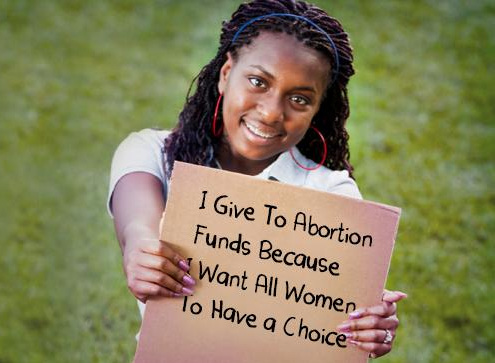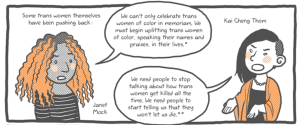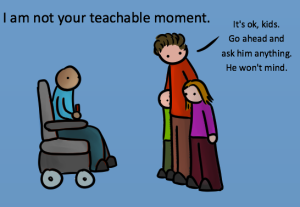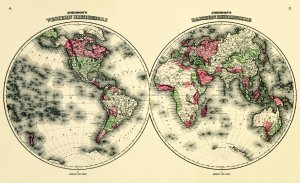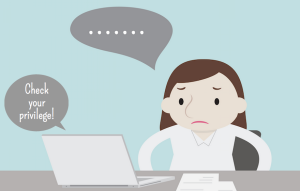Originally published on Feministe and cross-posted here with permission.
I am pro-choice because I believe women’s lives matter. I am pro-choice because I think women themselves are the best people to decide when and if they get pregnant, give birth, and raise children. I am pro-choice because I believe that the right to control your own reproduction is a fundamental right, and is protected both under our Constitution and basic human rights ideals — and I believe that fundamental right includes the right to prevent pregnancy, the right to get pregnant, the right to carry a pregnancy to term, and the right to terminate a pregnancy. I am pro-choice because I believe that if we outlaw a woman’s right to terminate a pregnancy, there is no legal argument against forcing a woman to terminate a pregnancy, or disallowing certain people from reproducing. I am pro-choice because I do not believe that anyone should be subject totalitarian laws which impose unwanted occupations on certain classes of people. I am pro-choice because I don’t believe that women should be legally compelled to maintain another life at the expense of her own wishes, her body, her health, or even her life. I am pro-choice because I don’t believe that women’s bodies should be used against our will. I am pro-choice because I believe that compulsory pregnancy and childbirth is immoral, cruel, and flies in the face of basic notions of freedom, liberty, and human rights. I am pro-choice because I believe that forcing women to carry pregnancies against their will is involuntary servitude. I am pro-choice because I believe that children should be wanted, their entrances into the world joyous occasions — that they should never be considered punishment. I am pro-choice because I want women to be physically and emotionally healthy. I am pro-choice because I don’t believe that pregnancy should be a punishment (or, as anti-choicers say, a “consequence”) of sex. I am pro-choice because I realize that my rights to birth control, to have children, to make my own decisions, to be a fully autonomous human being all hinge on my very basic ability to decide when and if I reproduce.
I am pro-choice because I trust women.
I am pro-choice because reproductive rights are far more than abortion, and because I want to see us live in a true culture of life — one where men, women and children are truly valued, and where pregnancy doesn’t turn a woman into a second-class citizen.
I am pro-choice because those who attack abortion rights don’t plan on stopping there — they’re also going after contraception, science and even sex itself. And they’ve got a whole lot of political capital.
I am pro-choice because I see what places look like when “pro-life” policies are the rule of law. I see it again and again and again.
I am pro-choice because I see what places look like when abortion is safe, legal and available, contraception is accessible, and sex is considered natural, normal, and something we should take responsibility for, not be ashamed of.
I am pro-choice because “pro-life” policies kill and maim women. I am pro-choice because abortion rates are no higher in countries where abortion is legal than in countries where it is outlawed — but countries where abortion is legal see lower maternal mortality rates, lower infant mortality rates, greater economic prosperity, and greater gender equality.
I am pro-choice because women who live in the developing world account for 95 percent of the world’s illegal abortions, and I believe that access to safe health care should not be contingent on where you happened to be born. I am pro-choice because the countries with the lowest abortion rates — Belgium, Germany, the Netherlands and Switzerland — have liberal abortion laws, good health care, comprehensive sex education, and accessible and affordable contraception.
I am pro-choice because many countries where abortion is illegal or highly restricted have significantly higher abortion rates than we have in the United States, and astronomically higher rates than we see in Western Europe. Some of those countries include Brazil, Chile, Bangladesh, Colombia, the Dominican Republic, Egypt, Mexico, Nigeria, Peru, and the Philippines.
I am pro-choice because of the number of women hospitalized after unsafe illegal abortions in these countries:
Bangladesh: 71,800
Brazil: 288,700
Chile: 31,900
Colombia: 57,700
Dominican Republic: 16,500
Egypt: 216,000
Mexico: 106,500
Nigeria: 142,200
Peru: 54,200
The Philippines: 80,100
I am pro-choice because 80,000 women die every year from complications from illegal abortion, and hundreds of thousands more are injured.
I am pro-choice because the risk of dying from abortion is far higher in countries where abortion is illegal than where it’s legal.
I am pro-choice because illegal abortion is the cause of 25% of all maternal deaths in Latin America, 12% in Asia, and 13% in sub-Saharan Africa.
I am pro-choice because I will not go back.
I am pro-choice because if Roe is overturned, abortion will be illegal in many states. Even with Roe in place, states like Georgia are considering legislation which would impose life in prison or the death penalty as punishment for women who have abortions and doctors who perform the procedures.
I am pro-choice because I don’t believe we should criminalize women and doctors for exercising reproductive freedom.
I am pro-choice because seeing the impact of abortion rights on a country’s prosperity, gender equality and overall well-being is apparent simply by looking at a map.
I am pro-choice because it’s the pro-choice movement that has advocated for policies which actually decrease the need for abortion, and which make it easier for women to have children: comprehensive sexual health education, affordable and accessible contraception (including emergency contraception), pre-natal and well-baby care, social support for pregnant women and women with children, affordable child care, fair pay for working women, supporting pregnant girls, and gender equality. Comparatively, the “pro-life” movement* has no interest in actually lowering the abortion rate; their ultimate goal is sexual control of women, evidenced by their opposition to contraception and their belief that there is only one singular way to live: abstain from sex until heterosexual marriage, and then have as many children as God gives you.
I am pro-choice because I see the positive impact that the pro-choice movement has had in the United States. Women go to college at the same rates as men. We can define ourselves as something other than mothers, or as mothers and something else. Poverty has been cut in half since Roe gave women the right to control their own reproduction. Men can be nurturing too, and are expected to take part in raising their children. Families can be planned. Men have greater choices in their occupations since they aren’t required to be the sole bread-winner. More people have access to education. Women have more power to escape abusive relationships or bad jobs. Parents of both sexes spend more time with their kids than ever before.
I am pro-choice because I care about children — and according to the Children’s Defense Fund, 100% of the worst legislators for children in this country are pro-life.
I am pro-choice because I believe that my body is mine. I want women, girls, men, and children to be healthy, valued, and cared for. I want families to be healthy.
I want to live in a country that values the lives and well-being of all of its citizens.
I am pro-choice because it is life-affirming. I am pro-choice because it is fundamentally just. I am pro-choice because to be anything else is to devalue and harm women, children, families, and my country.
I am pro-choice because my life is worth something.
*By “pro-life” movement, I mean the fanatical leaders of anti-choice organizations, not the individual people who identify as “pro-life” to mean that they dislike abortion and want to see the abortion rate decreased, but also support common-sense policies like sex education and contraception.
Search our 3000+ articles!
Read our articles about:
Our online racial justice training
Used by hundreds of universities, non-profits, and businesses.
Click to learn more


